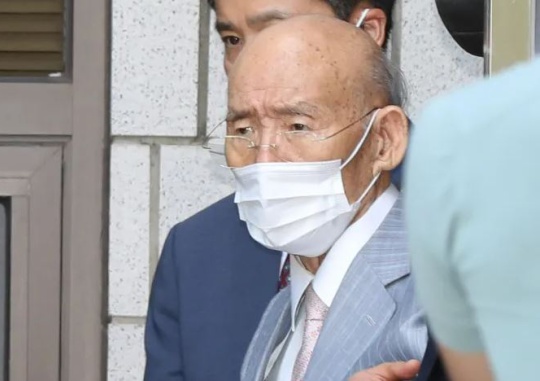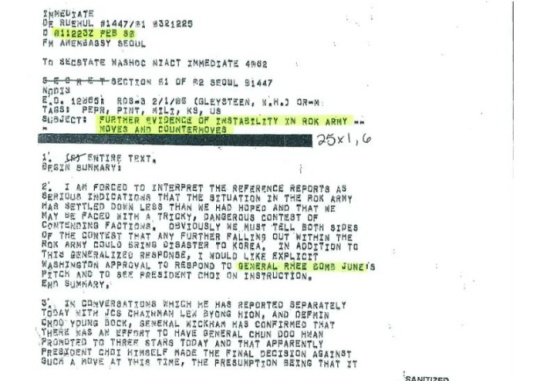The U.S. Knew, But Opposed a Counter Coup d'etat to Oust Chun Doo-hwan
이 글자크기로 변경됩니다.
(예시) 가장 빠른 뉴스가 있고 다양한 정보, 쌍방향 소통이 숨쉬는 다음뉴스를 만나보세요. 다음뉴스는 국내외 주요이슈와 실시간 속보, 문화생활 및 다양한 분야의 뉴스를 입체적으로 전달하고 있습니다.
[경향신문]

The United States detected movements for a “counter coup d’etat” to oust Chun Doo-hwan inside the South Korean military after the coup d’etat on December 12, but opposed the second coup believing that an attempt to return things back to before December 12 would result in disaster. Such facts were confirmed for the first time in U.S. diplomatic documents.
In declassified U.S. government documents on the May 18 Democratic Uprising, which the Ministry of Foreign Affairs recently received from the Jimmy Carter Library, there is a document from the U.S. Embassy in South Korea to the U.S. State Department dated February 1, 1980, reporting on an anti-Chun Doo-hwan scheme inside the South Korean military. It also cites the real name of the person who gave the U.S. this information as General Rhee Bomb June for the first time. General Rhee is thought to be the deputy minister of defense industry in the defense ministry at the time, who was an older graduate (8th class graduate) of the Korean Military Academy than Chun Doo-hwan (11th class graduate).
In the report, the U.S. Embassy stresses the need to clearly state the U.S. administration’s position to both Chun Doo-hwan and his opposing forces in connection to the tip from Rhee. The U.S. Embassy further mentions that the U.S. should clearly inform all parties that a group inside the military trying to return things to before the December 12 coup and another group (new military regime) trying to further strengthen its position and completely dominate the government would potentially bring disaster to South Korea.
The U.S. had negative views on the new military force’s attempt to seize power, but at the same time preferred to maintain the status quo. Thus, it appears the U.S. actually blocked an anti-Chun Doo-hwan movement inside the military. The Embassy further states that if they failed to reply to General Rhee, the silence could be interpreted as the U.S. turning a blind eye on the counter coup. The U.S. Embassy sought the approval of the State Department to deliver its position to General Rhee, telling him that the U.S. government would fiercely oppose any attempt by the commanders who seized power through the December 12 coup d’etat to further strengthen their position and try to dominate the civilian government. The U.S. administration also believed that other officers trying to return things back to before the December 12 coup would be just as dangerous.
The U.S. Embassy also asked the State Department for instructions to share the fact that the U.S. firmly warned Chun Doo-hwan and his opposing forces to President Choi Kyu-hah. The report also described General Rhee’s tip stating that the details were reliable, but that they could have been distorted when conveyed.
The documents that the Jimmy Carter Library provided (206 pages) included a memorandum from the White House National Security Council (NSC) on May 8, 1980 stating that a serious clash between students and the government was expected on May 15, 1980 in Seoul and that Chun Doo-hwan had already relocated 2-3 airborne brigades. The document named Chun Doo-hwan as the actual person who gave orders to move the airborne units, suggesting that the U.S. may have concluded that Chun Doo-hwan had complete command over the military.
The public can see the declassified documents at the May 18 Democratic Uprising Archives website.

Copyright © 경향신문. 무단전재 및 재배포 금지.
- 네이버, 소프트뱅크에 ‘라인’ 경영권 뺏길판…일본 정부서 지분 매각 압박
- “육군은 철수...우린(해병) 한다” “사단장님이 ‘하라’ 하셨다”···채 상병 사건 녹취록 공
- [스경X초점] “씨X·개저씨” 민희진 기자회견, 뉴진스에 도움 됐을까
- 나경원, ‘윤 대통령 반대’ 헝가리식 저출생 해법 1호 법안으로···“정부 대책이 더 과격”
- 공수처, ‘이정섭 검사 비위 폭로’ 강미정 조국혁신당 대변인 조사
- “매월 10만원 저금하면 두 배로”…다음주부터 ‘청년통장’ 신청 모집
- 아동 간 성범죄는 ‘교육’ 부재 탓···사설 성교육업체에 몰리는 부모들
- [초선 당선인 인터뷰] 천하람 “한동훈은 긁어 본 복권…정치 리더로서 매력 없어져”
- 니카라과, “재정 악화” 이유로 한국 대사관 철수 통보
- 현대차, 차량 내부 20℃ 이상 낮춰주는 틴팅필름 개발…‘뙤약볕’ 파키스탄서 실증